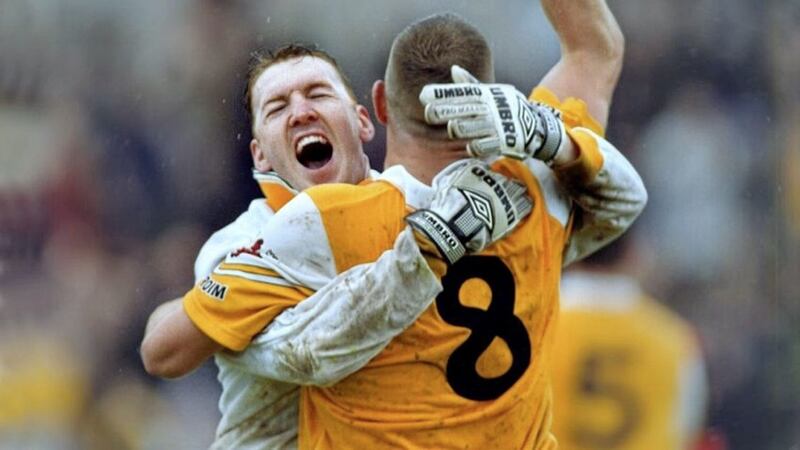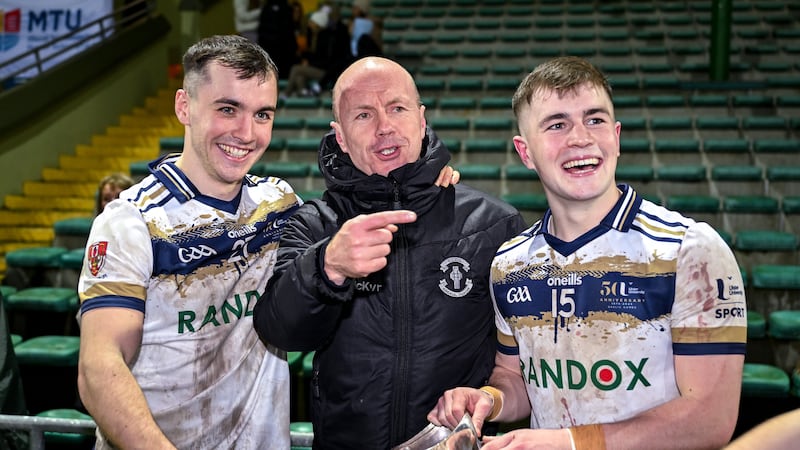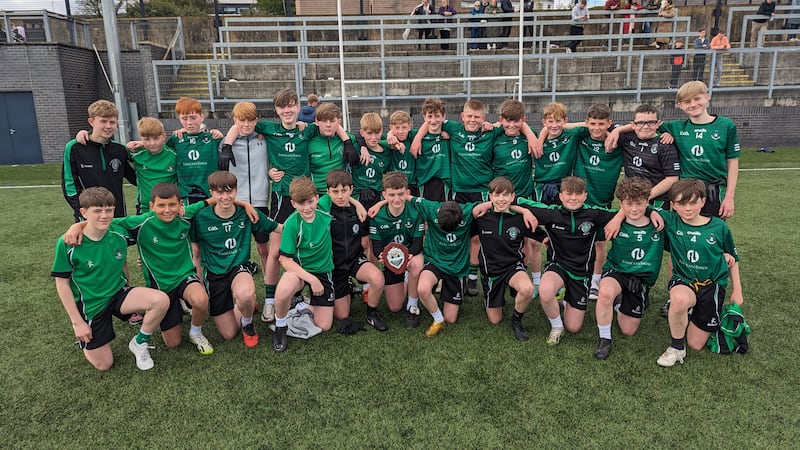WHEN he was 18, Sean McGreevy was so scared that PJ O’Hare might forget about him that he was no sooner out of a hospital bed than he was standing in the darkened winter bowels of Casement Park with the kitbag slung over his shoulder.
Bellowing from behind him is Frank Fitzsimons.
“Young McGreevy! What are you doing here? Get home!”
St Paul’s had played a double header of minor semi-final and senior final a month earlier. McGreevy had done goals in both.
The first went to extra-time and left him wholly confused as to whether to play extra-time or join the seniors for their warm-up, as had been the original plan.
They lost the minors to Cargin and, seemingly impossibly against 8/1 outsiders Rossa, the seniors were beaten too.
He woke the next morning with a doctor standing over him and his late mother, Anne, slapping him across the face to try and rouse him.
Scarlet fever was the diagnosis and he spent three weeks in hospital, having just been given a call-up to the Antrim squad for the first time.
Gaunt and weakened from all the weight he’d lost, he was duly sent home when he arrived up to training that night.
They didn’t forget about him. Brendan Devlin was in goals in Irvinestown as Antrim lost to Fermanagh in the summer of ’92, but by the following year McGreevy had assumed the number one shirt.
His championship debut was at a jammed MacCumhaill Park, where the people of Donegal squeezed in to see the All-Ireland champions begin the defence of their title.
“I’ll never forget the deafening ovation they got coming out on to the pitch that day. The man on the tannoy saying: ‘And now, welcome the All-Ireland champions…..’”
It was one of only three times in his career McGreevy got nervous about a game of football, the others being the Game For Anto and coming on in the Ulster final in 2009.
His angst increased when the Andersonstown News ran an opinion piece in the week of the game questioning the logic of putting a teenager into such a cauldron.
“I remember this pressure being put on, reading that story and it made me more nervous. In my head, we were never going to win the game and it was keeping goals to a minimum. I ended up keeping a clean sheet.
“My Mum said to me on the bus on the way home, she had the pleasure of meeting that journalist and asking him what he thought of my performance, because I did ok. He basically, hats off, said ‘he did very well’.”
Peter McGinnity told him on the field afterwards that it was a game Antrim had left behind.
It took a lot to convince the county’s footballers that a dawn was real.
In a career that began in 1992 and finally ended 22 years later, that was the thing that bugged McGreevy the most.
His own belief, in himself and those around him, was unstinting. When he spoke in the changing room, that was generally his topic.
He could rhyme off the half-dozen names from the early part of his playing days that had the requisite ‘cockiness’ to feel they could compete. Half-a-dozen wasn’t enough.
“When you’re playing for Antrim and you get used to eight or nine years on the bounce of losing in the first round of the championship, you do get used to almost being a loser. That’s terrible to say.
“I never felt myself I was a loser, I believed I was good enough. I wanted to be a winner and I got annoyed seeing guys happy being a county player and wear a tracksuit.”
He came into a team that had gone 10 years, and would go another eight, without winning a championship game. That made such a mentality understandable, if not quite forgivable.
Yet funnily, in all of those eight years, Cavan in 1995 were the only team to beat Antrim by more than four points. Four times they lost to Donegal and all of them were by a goal or less.
The raw materials existed. Until Brian White came in, they just didn’t believe.
* * * * * * * * * * * * * *
“It was no wonder that the cheers of sheer delight echoed across the Falls Road at the sound of the final whistle which came after Down made every effort to force an equalising goal. That they couldn’t find the breakthrough was in no small way due to the heroics of keeper Sean McGreevy. The man of the match stood firm and made one brilliant save after another, including a crucial penalty stop from Gregory McCartan after 21 minutes of the second half…. That save probably won the game for Antrim.”
Tom? O’Riordan, Irish Independent, May 29, 2000
TEN to go. Eight to go. Six to go. Four. Two. Stoppage time.
Thunder, lightning, rain, history, Blaneys, Lindens, McCartans all, nothing could stop Antrim’s victory charge that day.
Even the umpires seemed to get caught up in the emotion. And as time ticked away through the second half, McGreevy kept hearing the call come in his ear telling him how long was left, until he dug the final divot on the corner of the six-yard box.
“It’s on the blow, it’s on the blow!” he could hear the umpire call.
After 18 years, nobody is immune to the day’s emotion.
Three men in white stand in the goal that hears the Andersonstown Road’s hum, one bogged to the eyeballs and the other two soaked to the skin.
The umpires have been lassoed in by the day, but McGreevy’s emotional investment runs deep. His heart almost aches at the interminable feeling of Antrimness, and that something from somewhere will come along to take it away.
McGreevy makes save after save after save. Gregory McCartan, having already drilled one penalty down the centre, goes low to the corner with his second. A heavy ball, greasy turf, history weighing in his favour, it seems like the right thing to do.
Even that doesn’t beat the Antrim goalkeeper.
It was the defining day of Sean McGreevy’s career. Off it he’d win an Allstar nomination, an Irish News Ulster Allstar, national recognition. He’d find himself invited into schools all around Belfast, spreading the gospel and unearthing his grá for coaching.
“The whistle goes. To us, it was like we were All-Ireland champions,” he says, sipping on a coffee as the Olympia Leisure Centre buzzes around him.
“I’ll never know the feeling of being an All-Ireland champion but after 18 years not winning a match and suffering for Antrim fans… I remember Joe Quinn coming in and it was hard to take in.
“We’ve beaten Down, these legends of the game. Brian White came in afterwards and said ‘you’ve made history’.”
His mud-stained white jersey hugged everything in sight. His mother, an avid supporter, joins the saffron army in exploding on to the grass.
Having lost both his parents just prior to Christmas in recent years, Pat in 2015 and Anne in 2016, his throat cracks.
“I remember my Mum, God rest her…. She comes running on the pitch… She’s hugging me, my wee sister’s there. ‘You’ve done it, you’ve done it!’”
They felt primed, but the final push came from the famous pre-match speech by former Antrim minor selector Dessie Reynolds, who asked Brian White if he could have two minutes to talk to the players.
Reynolds was terminally ill and as he told the players he had just weeks to live, tears started rolling down his cheeks.
“There’s tears coming out of his eyes and he just says: ‘Guys, I only have a few weeks left. I just want to see Antrim win a game in the Ulster Championship.’
“You’re in your own world and this guy’s standing telling you he’s about to die, and all he wants is to see us winning a game of football? It’s surreal.
“I was sitting beside Kieran Killyleagh, a clubmate of mine. We had arms around each other, and I remember feeling this grip that said ‘holy f***, this is what it means to this man’.”
White coming in, originally as caretaker manager, had been the catalyst for it all.
Harry Brennan was Queen’s sports science officer and had worked with Ulster rugby in winning the European Cup in ’99, and was drafted in by White to spruce up Antrim’s training. Hugh McGettigan’s analysis of opposition teams was ahead of its time.
Club rivalries, which McGreevy had noted from his very early days on the panel when players from different clubs would sit in their own groups, were left outside the door.
“He told us we weren’t St Paul’s or St Gall’s or Cargin or Rossa, but we were Team Antrim.
“Whitey put a bit of arrogance into us too. As if ‘why would you think you’re any less from guys across that border into Derry or Down? Why are you any less than Greg Blaney, who plays for Carryduff in Belfast?’
“He pumped real belief into us. Anto was the captain and things start moving. We win the All-Ireland B in ’99 and there’s a bit of belief there.
“Antrim county board could have done more to embrace that at the time. That was a big thing for Anto Finnegan to stand in Casement Park with that cup. We felt like we weren’t just this crap team involved in a competition for the sake of it any more.”
The memories fill him with warmth. All of it. From the full repertoire of saves to swearing on live radio while being interviewed by Martin McHugh to the euphoric high that almost carried them past All-Ireland champions Derry as well, it was a magical time.
When he recently met Enda Muldoon and Joe Cassidy separately, both told McGreevy the story of how after Anthony Tohill had pulled the ball down from above the crossbar to deny Antrim an even more famous semi-final win, Gerry Adams – whose son Gearoid was on the Antrim team – visited the Derry changing room.
“They told me Eamonn Coleman, before the replay, went through the roof, roaring: ‘There’ll be no f***ing Gerry Adams in this f***ing changing room today! Yiz were like lapdogs!’”
Derry survived the late onslaught and the lack of that real, immovable inner belief within Antrim reared itself in the replay.
That team’s bond remains to this day. They go out together at least once a year. The yarns might be recycled but the sparkle is never lost.
One championship victory was all the real money they had in their pocket by the end of it, but they went so long without winning that the county’s stomach thought its throat had been cut.
Another dawn threatened but just as the sun began to give hope, the clouds rolled in. Within months, a dark dusk had descended that would destroy it all.
* * * * * * * * * * * * * *
“There will be people who will unfortunately decide that they don't want to be part of the (county) set-up. That is regrettable given the year we have had with our win against Down and the magnificent performance against Derry...But if we had not taken the action we have taken and not suspended county players, then we would have had double standards.”
Antrim GAA chairman Joe O’Boyle, October 5, 2000
WHEN former players retire and say they don’t carry regret, Sean McGreevy doesn’t believe them.
His sense of regret for the brawl that marred the 2000 Antrim football final between St Paul’s and Cargin, and the way in which it ripped the county team apart, remains unbearable.
Cargin were stripped of the title (although later given it back), with eleven players hit by bans that ranged in length from 12 to 48 weeks. Both clubs were initially kicked out of all senior football for the remainder of 2000 and the whole of 2001, before some of it was eventually watered down.
McGreevy found himself up in front of the county board, cited for allegedly breaking an opponent’s jaw, which he has always vehemently denied.
“I knew I didn’t throw a dig at anybody.”
He insists he acted as peacemaker, talking county team-mate Eddie Quinn into trying to calm tensions on both sides, impossible though that proved.
The county board exonerated him days later.
It was the finish of that St Paul’s team, which had won three Antrim titles between ’94 and ’97, as well as losing finals in ’91, ’99 and 2000.
They were coming to a natural end and it was hastened by events.
Antrim, though? They should only have been starting.
“What happened that day should never have happened, and it should never have got to the point that it affected things as much as it did.
“I always regret that happening and I regret the county board dealing with it as they did.
“For the first time in a long time, we had something in the county setup.
“They knew St Paul’s and Cargin were the two main clubs and that if they closed them, Antrim would suffer. Common sense would have told you that.”
Not four months after they’d ended an 18-year wait for a win in Ulster, after they’d pushed Derry to the wire, and here was Brian White having to beg players to come back.
Some didn’t. Cargin’s Sheeny McQuillan, outstanding in 2000, never returned and was a monumental loss to the county team.
“After the crest of a wave, Brian White is literally knocking doors to get players to play for Antrim. It’s even worse than before – have you even a team to field?” says McGreevy.
“I remember feeling ‘why would I want to represent my county now?’ I said to Whitey I had to think about it. I didn’t want to let him down.
“You’re torn between two worlds. You want to represent your county and you’ve come so far the last year, but you’re also dealing with a county board who came up with this decision that they’d ban us.
“They should have made sure guys who deserved to be punished were, but they did it to the point where people didn’t want to play for Antrim any more.
“It ruined what we had built.
“I’d already given it nine years at that stage and you’re thinking do you want to start over?”
He swallows his pride and goes back, but summer brings two more meetings with Derry. They lose in Ulster and then in the new-fangled qualifiers too. When there are ten points between them in 2002, it’s over.
Brian White resigns after defeat by Westmeath. For that generation, the feeling they had in the summer of 2000 never comes back.
The team disassembles, bit-by-bit. By the time they reach an Ulster final under Liam Bradley nine years later, only McGreevy and Kevin Brady remain.
But what ought to have been Sean McGreevy’s best day in an Antrim jersey turns into his worst…








